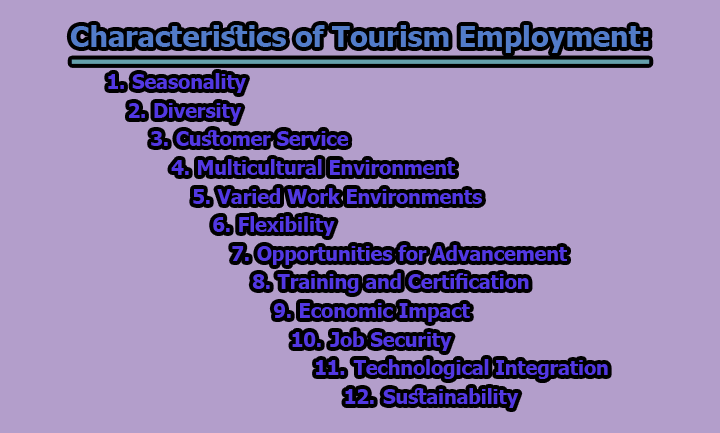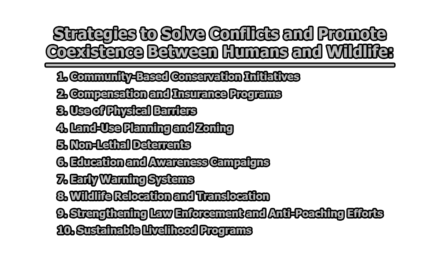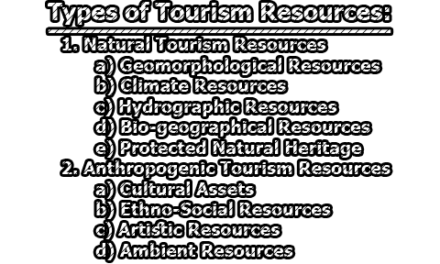Characteristics of Tourism Employment:
Tourism employment encompasses a wide range of jobs and opportunities within the tourism industry. These jobs are often diverse and can be found in various sectors, including hospitality, travel, transportation, and more. The characteristics of tourism employment are influenced by the dynamic nature of the industry, which is subject to seasonal fluctuations, cultural diversity, and the need for excellent customer service. Here are some key characteristics of tourism employment:
1. Seasonality: Seasonal fluctuations in tourism employment are not just limited to specific destinations; they vary by the type of tourism. For example, cultural tourism may peak during festivals or holidays, while eco-tourism destinations may experience increased visitation during certain wildlife seasons. Seasonality affects job stability, as many workers in the industry experience temporary employment, leading to financial challenges during the off-season.
2. Diversity: Tourism jobs encompass a wide range of skills and backgrounds. From tour guides with in-depth knowledge of local history to hotel managers with expertise in hospitality management, the industry embraces diversity. Furthermore, tourism offers opportunities for people from various age groups, including young workers gaining their first job experience and retirees seeking part-time or seasonal employment.
3. Customer Service: Excellent customer service is a hallmark of the tourism industry, but it extends beyond basic courtesy. The ability to understand and meet the unique needs and preferences of tourists is crucial. This includes personalization, empathy, and the skill to handle unexpected situations, such as travel disruptions or medical emergencies.
4. Multicultural Environment: Interacting with visitors from diverse cultural backgrounds requires not only sensitivity but also cultural competence. Tourism employees often need to understand the customs, expectations, and communication styles of different cultures. This promotes a positive and inclusive visitor experience.
5. Varied Work Environments: Tourism jobs are found in a vast array of settings. From luxury resorts and bustling airports to remote national parks and intimate bed-and-breakfast establishments, workers can choose environments that align with their interests and career goals.
6. Flexibility: The flexibility of tourism jobs often extends to the choice of work location. Professionals in the industry, such as digital nomads or seasonal workers, can experience different destinations and cultures while earning a living. This flexibility not only suits students, retirees, and part-time job seekers but also contributes to cultural exchange.
7. Opportunities for Advancement: Career growth in tourism is possible through the dedication and continuous learning. Entry-level positions often serve as stepping stones to supervisory or management roles. Advanced degrees, industry-specific certifications, and on-the-job experience can open doors to higher-paying and more specialized roles.
8. Training and Certification: The need for training and certification is critical, especially in roles that concern safety and guest services. Lifeguards, for example, must undergo rigorous training to ensure the safety of swimmers. Tour guides may need to complete courses in historical and cultural knowledge to provide informative tours.
9. Economic Impact: The economic impact of tourism employment reverberates through various sectors of the economy. In addition to creating direct job opportunities in hotels, restaurants, and transportation, tourism stimulates local agriculture, handicrafts, and retail businesses. It can be a catalyst for regional development and infrastructure improvement.
10. Job Security: While tourism has proven resilient, job security can be contingent on factors such as geopolitical stability, health crises, and environmental sustainability. Economic downturns can affect certain segments of the tourism industry more than others, highlighting the importance of diversifying skills and remaining adaptable.
11. Technological Integration: Technology’s integration in tourism continues to reshape the industry. Mobile apps, online booking platforms, and big data analytics play a vital role in decision-making, marketing, and guest experiences. Workers must adapt to these technologies to stay competitive and meet changing customer expectations.
12. Sustainability: The growing emphasis on sustainable tourism practices is a response to environmental concerns and the desire to minimize negative impacts on host communities. Tourism employment now often involves a commitment to responsible tourism, including waste reduction, wildlife conservation, and the support of local communities.
In conclusion, tourism employment offers a dynamic and diverse range of opportunities but is subject to complexities that require adaptability and a commitment to quality service and responsible practices. The tourism workforce has the potential to contribute significantly to the global economy while fostering cultural exchange and environmental stewardship. However, the challenges of seasonality, the need for continuous learning, and addressing sustainability concerns remain at the forefront of the industry’s evolution.

Library Lecturer at Nurul Amin Degree College










